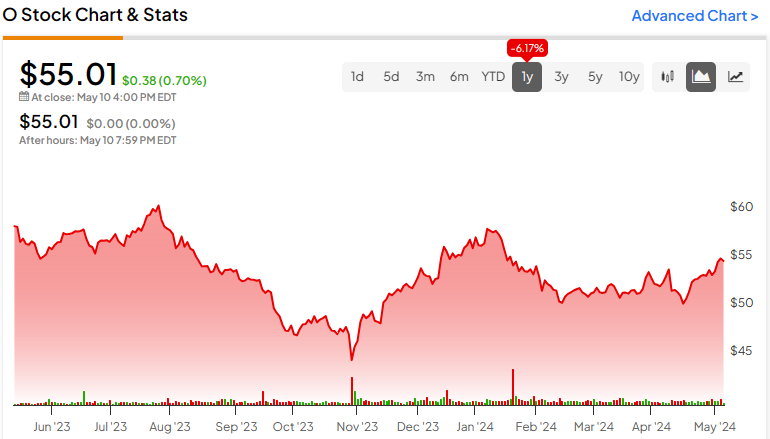Realty Income Corporation (New York Stock Exchange:O) The year-over-year decline reflects systemic headwinds built into that asset class. The real estate investment trust (REIT) has lost about 10% of its market value over the past year, which goes against the essence of its “full cycle” business model. At first glance, key indicators suggest that real estate income is unlikely to recover from recent losses. However, Realty Income announced some great news earlier this week, revealing an impressive first quarter earnings report that exceeded revenue targets by $160 million.
The question, of course, is whether Realty Income's latest results tell the story. After considering a wide range of detailed variables, I believe Realty Income's fundamental metrics and recent capital structure decisions outweigh the positives shared in its first quarter earnings report. We have judged that Realty Income's outlook is neutral. Let's take a closer look at real estate income.


Understand the recent performance of O stock
For those who don't know, Realty Income Corporation primarily functions as a triple-net retail REIT. The fund's portfolio spans more than 15,450 properties, has an occupancy rate of 98.6%, and typically maintains cash capitalization rates of 7% or higher. Realty Income Corporation is also known as a “monthly dividend company” because of its guaranteed monthly dividend payments. So, essentially, this REIT is considered a leading company.
As mentioned in the introduction, systemic headwinds have contributed to the recent weakness in real estate income. For example, a prolonged high interest rate environment has compressed commercial real estate valuations. Furthermore, uncertain economic conditions have increased real estate risk premiums and at the same time reduced REIT valuations.
Additionally, unique concerns likely contributed to Realty Income's poor performance. For example, Realty Income has restarted its capital roadmap. The company raised about $1.8 billion in debt and equity in the first quarter, a result that raised eyebrows given its high cost of capital. Although a portion of the proceeds will be used to repay debt and investment opportunities are increasing, the need for external liquidity and uncertain economic conditions are likely to create headwinds for the market value of real estate income.
Reports first quarter profit with strong real estate income
Realty Income Corporation's first quarter earnings report provides important talking points. The company had adjusted cash from operations of $862.9 million and net income of $129.7 million.
While the headline results are telling, the focus of the report includes news regarding the acquisition of Spirit Realty. Realty Income Corporation has acquired Spirit Realty in a stock-for-stock transaction valued at approximately $9.3 billion, joining Realty Income's single-tenant triple-net portfolio. This acquisition creates notable synergies. However, it remains to be seen whether it will increase.
Additionally, Realty Income completed a direct acquisition during the first quarter. This fund conveyed a series of tactical bets in which he invested $598 million at a cash yield of 7.8%.
Finally, real estate revenue led to same-store rent growth of 1% for the remainder of the fiscal year. If this number continues, investors will be very happy given the current challenges in the real estate market.
Key fundamental and valuation metrics are called into question
Parallel qualitative headwinds exist for the real estate revenue company, giving it an opportunity to examine its fundamental metrics to establish the truth.
Further investigation reveals that real estate income likely does not represent fundamental value. For example, the average rent-to-gross property ratio of 11.86% is below the sector median of his 12.96%, indicating a lack of real estate-specific gross yield. Additionally, Realty Income's price to operating income ratio of 13.8x is in line with the sector median of 13.0x, while its forward dividend yield of 5.6% is significantly higher than the sector median of 4.67%. It does not mean.
In short, a relative analysis of its basic indicators combined with the qualitative factors mentioned above shows that real estate income may not be a market-outperforming asset, but rather a so-called market-performing asset. You can see that it's expensive.
Technical analysis of real estate income paints two pictures.
Assessing factors such as market sentiment and investor psychology is considered important by smart investors. Therefore, observing technical indicators is essential for comprehensive investment analysis.
A prominent technical indicator for Realty Income Corporation is the simple moving average. The REIT recently broke out of its 10-day, 50-day, 100-day, and 200-day moving averages, suggesting a momentum trend is forming. Additionally, Realty Income's put/call ratio of 0.69 reflects the optimism of short-term traders.
It is important to note that momentum trends and option activity can be countercyclical. Therefore, it would be prudent to look for a structural solution, especially since the fundamentals of real estate income are at stake.
Is O stock a buy, according to analysts?
Turning to Wall Street, Realty Income Corporation has a Moderate Buy consensus rating, based on 3 Buy and 5 Hold assignments over the past three months. O's average price target of $58.75 implies an upside potential of 6.8%.


summary
A closer look at Realty Income Corporation's first quarter earnings report shows that the company is in good hands. However, a combination of systemic headwinds and questionable fundamental metrics cast doubt on whether REITs will be able to garner any notable support from investors in the coming quarters. As such, Realty Income Corporation is unlikely to recover from its year-over-year decline any time soon, especially considering Wall Street's moderate price target.
disclosure


